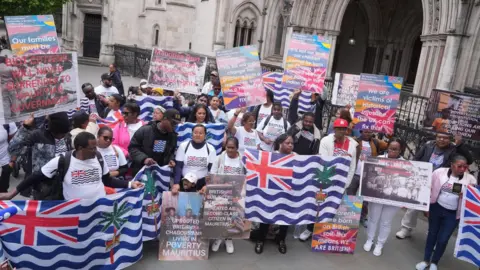In a significant development concerning the Chagos Islands, a recent report from a United Nations panel has urged the United Kingdom (UK) to void an agreement with Mauritius that addresses the future of this strategic archipelago in the Indian Ocean. The panel articulated concerns that the current deal fails to adequately protect the rights of the Chagossian people, who were forcibly expelled from their homeland in the 1960s and 1970s to facilitate the establishment of a military base on Diego Garcia, the largest of the Chagos Islands.
The deal, signed last month, which returned sovereignty of the Chagos Islands to Mauritius, continues to permit the UK to maintain military operations on Diego Garcia indefinitely. The UN experts expressed dismay, arguing that this arrangement effectively obstructs the rights of the Chagossian population to return to their ancestral lands, undermining their cultural heritage and identity.
A spokesperson from the UK Foreign Office maintained that the UK-Mauritius agreement had received support from various international organizations, including the UN Secretary-General. However, the UN’s independent panel, consisting of four experts appointed by the Human Rights Council, emphasized that retaining the military facility hampers the Chagossians’ cultural rights by limiting their access to the lands from which they were expelled.
The experts’ recommendations include suspending the existing agreement and negotiating new terms that would enhance protections for the Chagossian people. Currently, the deal stipulates that the UK would pay approximately £101 million annually to operate the military base for the next 99 years, in collaboration with the United States. This substantial financial arrangement raises ethical questions, particularly given the historical injustices faced by the Chagossian community.
Geographically, the Chagos Islands are located about 5,800 miles from the UK and around 1,250 miles from Mauritius. The UK acquired the islands for £3 million in 1968 after Mauritius was supposedly coerced into relinquishing sovereignty over them as a condition for its independence from British colonial rule. Following the establishment of the military base, most Chagossians were forcibly removed and relocated in Mauritius, Seychelles, or some resettled in England, primarily in Crawley, West Sussex.
This situation has persisted for decades, with Chagossians barred from returning to Diego Garcia. In an act of desperation, two Chagossian women residing in the UK—both native to Diego Garcia—attempted to legally obstruct the agreement shortly before it was ratified. They argued that the deal neglected to secure their right of return to their birthplace.
The UN panel reported that the current deal also includes a £40 million trust fund aimed at supporting the Chagossian community. Yet, the panel questioned whether this provision fulfills the requirements for effective remedies and reparations. Moreover, they highlighted that the agreement lacks mechanisms to ensure access to culturally significant sites on Diego Garcia, thus failing to protect the unique cultural heritage of the Chagossian people.
In response to the ongoing controversies, Shadow Foreign Secretary Dame Priti Patel criticized the agreement as unfavorable to both British taxpayers and the Chagossians themselves. She has initiated a bill in Parliament aimed at obstructing the deal, emphasizing the need for genuine dialogue with the Chagossian community before proceeding with any agreements that impact their lives.
As the situation develops, both the House of Commons and the House of Lords have until July 3 to pass a resolution opposing the ratification of this contentious agreement, highlighting the continuing complexities and historical injustices faced by the Chagossians as they seek acknowledgment of their rights and a pathway to return to their homeland.



